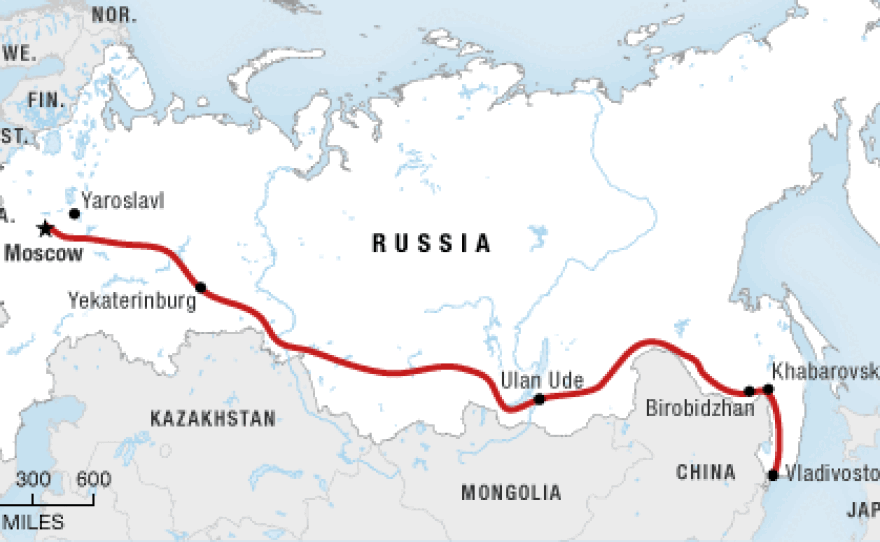A Trans-Siberian train can feel like a lonely place.
One night, on hour five of a 24-hour leg from Yaroslavl to Yekaterinburg, I stood in the corridor outside our cabin, looking out at peaceful emptiness. A half moon lit the blanket of snow that stretched into the distance.
There are occasional intruders.
A young train worker clamored by carrying cans of "pivo" — Russian for beer. His wobbly walk suggested drinking the pivo was far more fun than doing his job of selling it.
Then came the freight train, pulling box cars and oil tanks, zooming loudly west. By night and by day, other trains pass perhaps every 5 or 10 minutes. In those moments, you're reminded that this is a bustling highway cutting across an otherwise frozen, quiet landscape.
I now understand why the literature describes getting into a Trans-Siberian mindset, where you spend the long journeys gazing out the window, thinking. You're eager for the next stop, where even the smallest things are thrilling: Will there be a "babushka" — an older Russian woman — selling tasty dried fish? Or jam? Or homemade pies?
It's an environment that makes you eager to make friends, which is indeed a Trans-Siberian tradition.
Somewhere west of Yaroslavl, we ventured over to a nearby cabin, where Janna Rutskaya was sitting along the window, with two other passengers. "We just met, two hours ago," she tells me.
They were sharing a compartment with four beds. By day, the two lower berths serve as couches.
Rutskaya was on a nonstop, five-day trip from Moscow to her home, Chita, in Russia's Far East. It's Russia's frontier, a city that grew up on silver mining and was heavily secured during the Cold War — foreigners were forbidden — because so many military personnel were based there.
Rutskaya works in a hotel in Chita, and her husband was in the military. Moscow was only a stopover for her — she was on vacation even farther west, in the former Soviet republic of Belarus, visiting her parents for the first time in two years.

Flying to see her family is too costly. The train ticket is expensive enough, so she goes home to Belarus only seldom.
The long train rides, she says, are a time to relax and indulge in a favorite pastime — reading detective novels. And she loves the camaraderie.
After we chatted for a while, I told her and her cabin mates that we had some food if they were interested. Not realizing I had just offered the cue to begin a Russian tradition, Rutskaya smiled, saying, "We are ready, too."
Sharing food on the train is how friendships are cemented.
She opened a jar of "khren and smetana" –- horseradish and sour cream. It was homemade, from her parents. She sliced off a chunk of Belarusian dried sausage, spread the horseradish concoction on the meat and handed me my first taste. It was my first of many -– delicious.
I went to our cabin to grab whatever we could offer -– grapes from a store at the train station in Moscow and Clif bars from America.
Our new friends politely accepted and thanked us. But I know we had gotten the better end of the deal.
We've got to do better in this department. Finding some fresh, tasty offerings to share is priority one next time our train makes a stop.
Copyright 2022 NPR. To see more, visit https://www.npr.org. 9(MDAzMjM2NDYzMDEyMzc1Njk5NjAxNzY3OQ001))







